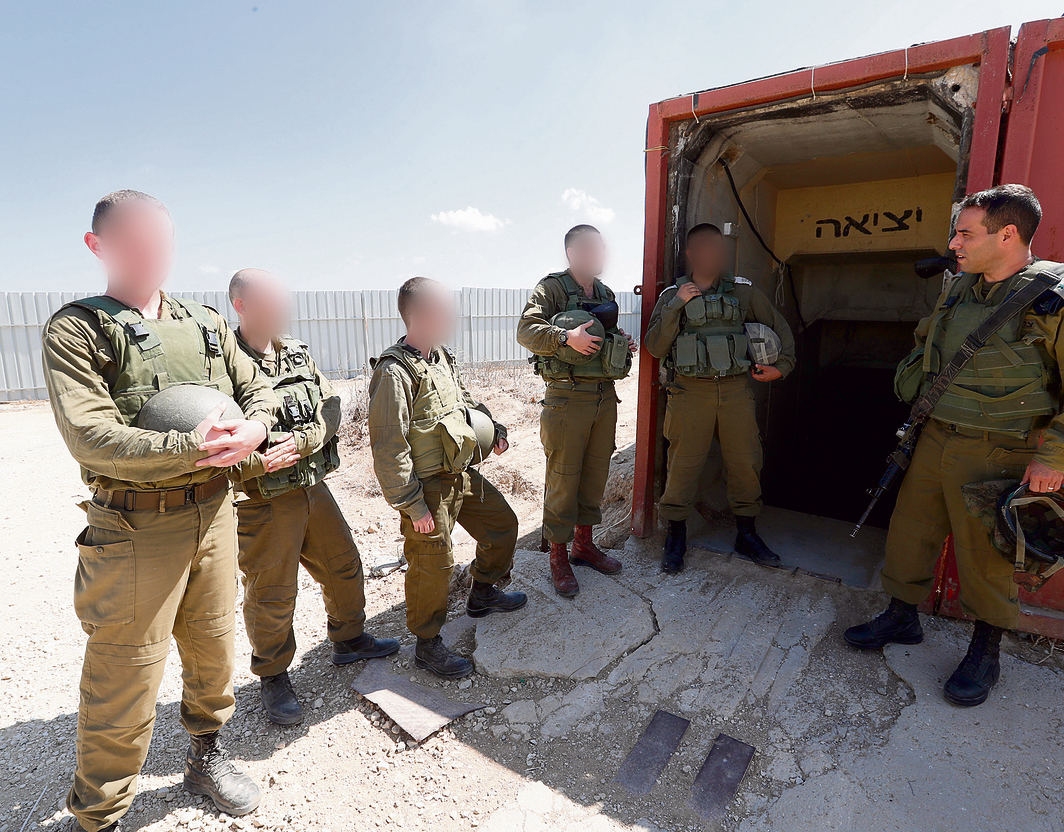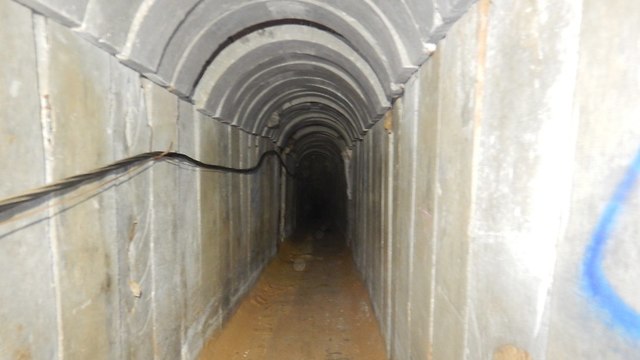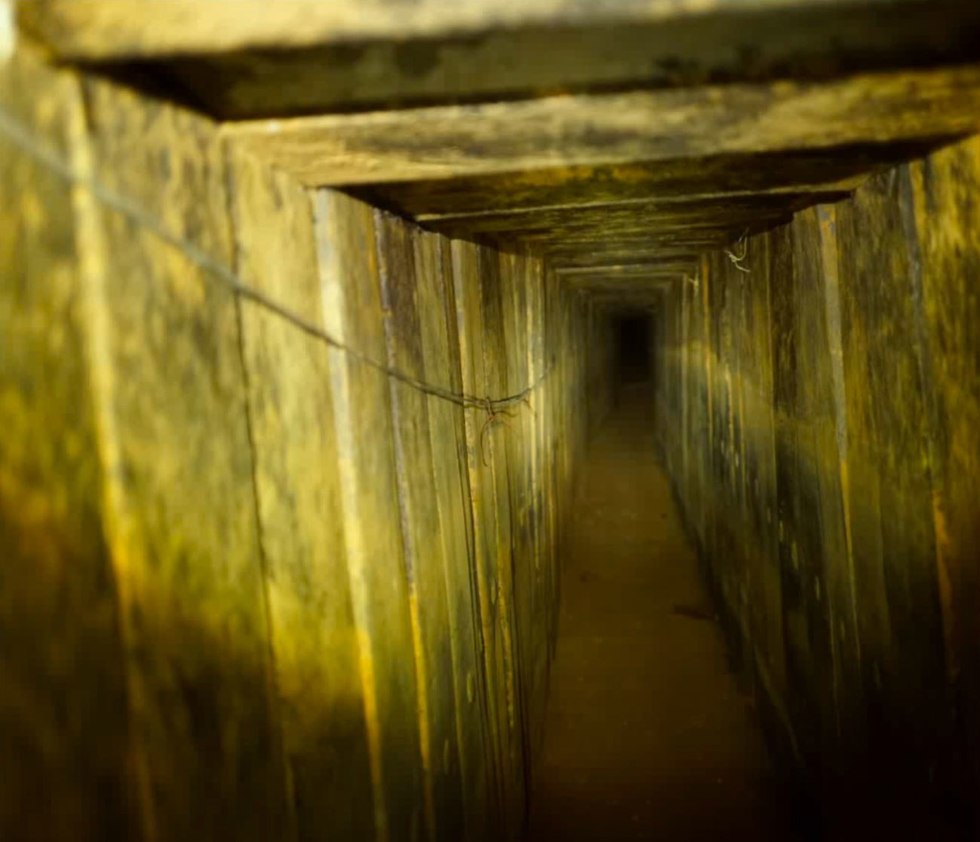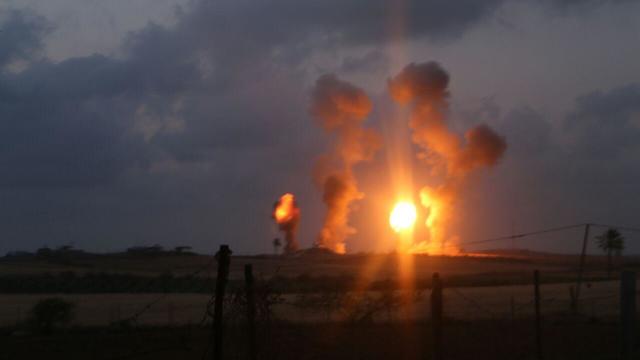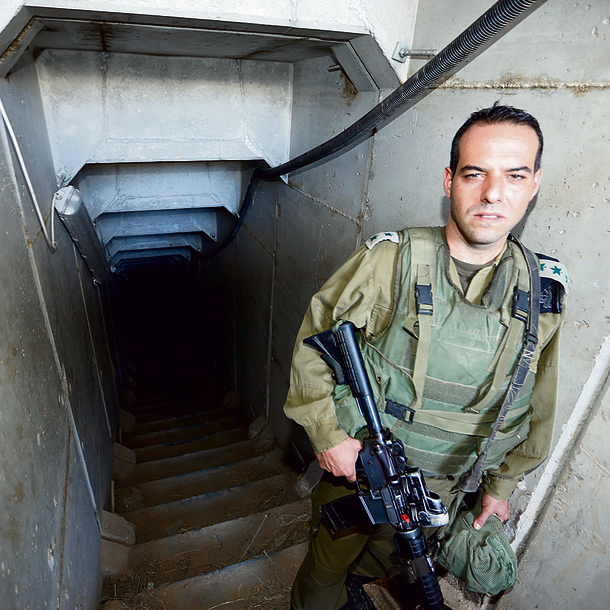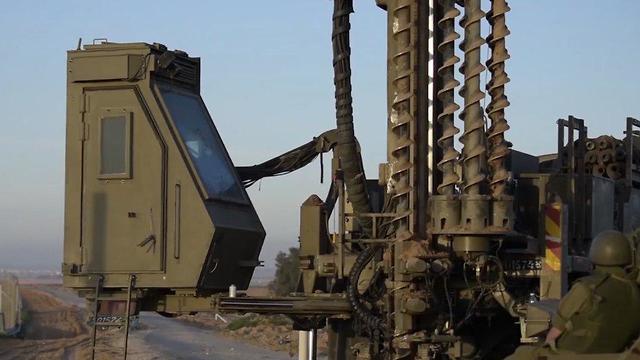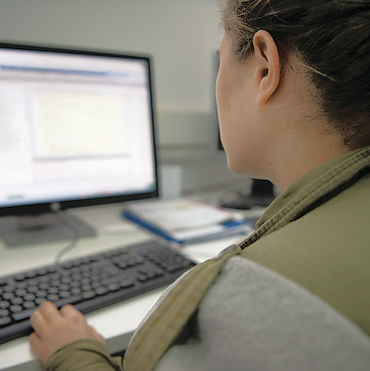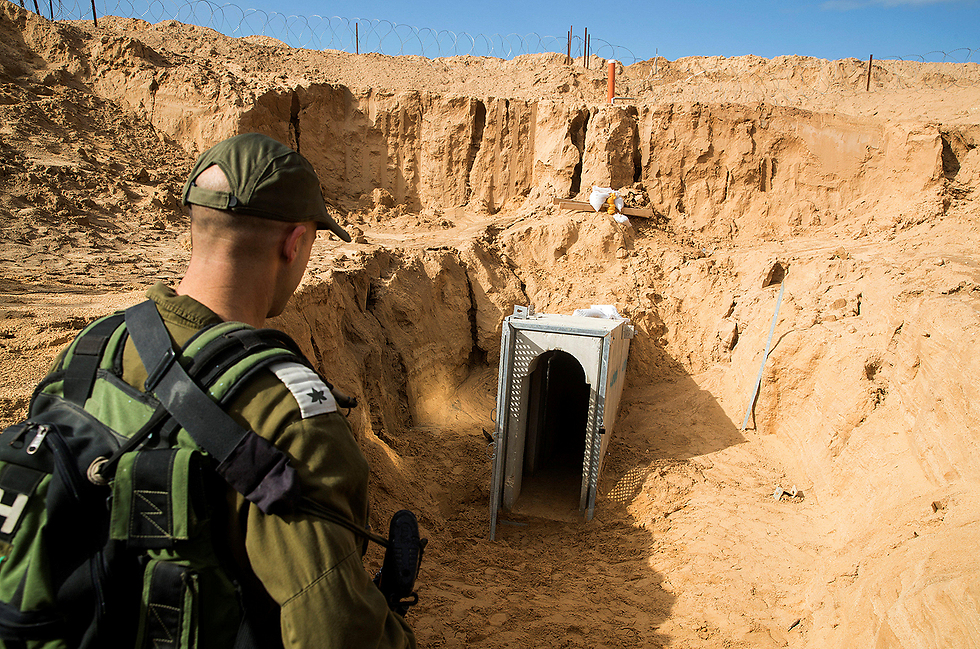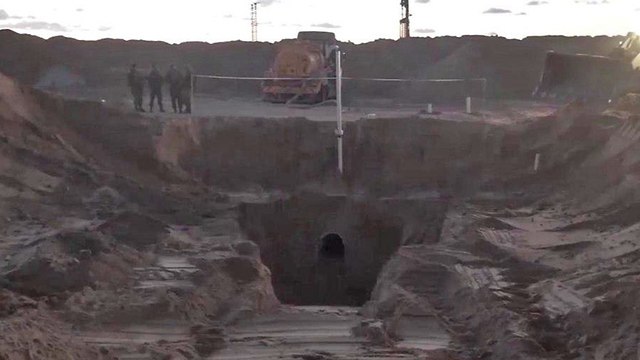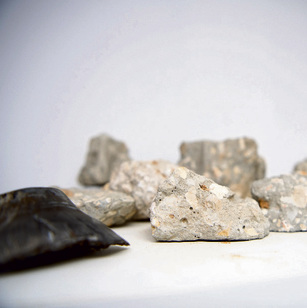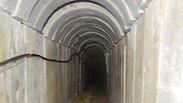

'We spend days and nights in the field until we find the tunnel'
Based in three trailers near the Gaza border, with advanced computers and technologies, is 'the lab': 10 soldiers—some of whom finished their physics degree in high school—who already found 15 terror tunnels, the latest neutralized this week; when the need arises, they go out to the field and under the ground; 'finding a tunnel is not a scavenger's hunt. It's a game of chest against Hamas,' says one.
Sgt. Lavi, 20, a genius who finished his BS in physics and mathematics while still in high school, enlisted in the IDF about two years ago and was sent to a car mechanics' course in the Ordnance Corps. Like many soldiers who were assigned to positions that don't fit their skills, his father intervened—with good reason—and searched for a place that would be better suited to his son's talents, where the army could also benefit from him. And so the State of Israel gained one of the IDF's few experts on locating underground tunnels.
At the time, some two years after Operation Protective Edge, the IDF and the defense establishment were at a loss when trying to find ways to locate Hamas's tunnels, which crossed the border and got all the way to Israeli communities. The first project that was launched was the underground obstacle under the border fence, which will be completed next year. The second project, which was launched almost in tandem, was the "technological laboratory to locate tunnels," or, in short, "the lab."
"The idea began to take shape even before Protective Edge," says Col. Yaniv Avitan, the head of the Collection and Assault Unit in the Technological Division of the Ground Forces. "The first steps were made in February 2016, when we started concentrating the efforts to develop technological capabilities to locate tunnels. The beginning was difficult. Many were surprised and couldn't understand why the Ground Forces' Technological Division was dealing with tunnels. But despite the surprise, everyone very much wanted to find a solution, and so we got all of the tools and backing."
While they were working, they realized that to succeed in realizing the advantages of the technology, it wasn't enough to merely develop it from afar, it must be tested again and again in the field. This is how the "technological laboratory to locate tunnels" came to be—a small group of less than 10 soldiers, with Lavi being one of them, who may be part of the Technological Division, but were physically far away from there, at the Gaza Division's base, right on the strip's border.
This group was joined early on by the best minds recruited for this project from the Technion, the Weizmann Institute of Science and other universities, including geologists, physicists and mathematicians. The technological side was bolstered with the intelligence capabilities of the collection unit 8200 and other units from the Military Intelligence Directorate (MID) and the Shin Bet, as well as the operational capabilities of the Gaza Division.
"The unit's move to the field was met with quite a few raised eyebrows, but nowadays people understand it's vital," says Col. Avitan. "The decisions happen here, in the division, and we cooperate with the intelligence and operational personnel here. We have to carry out research activities in the field. We're the technological arm of the Gaza Division's situation assessment, and if we're not here, we won't be able to influence decisions."
To this day, over two years after it was established, the lab is still located in a complex of three trailers you need a code to enter, inside of which are computer terminals.
"When I first got here, there was hardly anything here," Lavi remembers. "A few computers, even less people than now. Slowly we started getting into the thick of it. Everything was done through trial and error. Such a project, a different kind of project, incorporates physics with other fields."
"Because it was all so brand new, and that this was the only body in Israel of its kind, it started with amorphous missions—to find tunnels—which later took shape and became concrete missions," explains Cpt. Bar, 27, the lab's commander. "The entire development of technological measures to locate tunnels was done with real links to the field, to the ground. Sometimes things succeeded, as we thought they would, and sometimes the exact opposite happened."
The soldiers who joined the lab's team got there through the Palmach's word-of-mouth method. "We got a 'carte blanche' from the Manpower Directorate to bring in anyone we wanted," reveals Brig. Gen. Yehuda Fuchs, the commander of the Gaza Division, who treats the lab as his "baby."
"We created a working environment for them that is unusual for the division," he says with notable pride.
The lab's soldiers were handpicked. Amir, who did his degree in physics during high school alongside Lavi, also came to the lab and is currently in officers' course on his way to becoming the lab's first homegrown officer. Some seven months ago, they were joined by Sgt. Adam, who also, unsurprisingly, studied for his BS in physics with Lavi and Amir while he was in high school.
Like Lavi, Adam was also not initially placed there, and was first sent to the C4I Corps to serve as a quartermaster clerk. "Locating the people for this place is a focused project, much like locating the tunnels," Adam says. "You need people who are smart, who have the initiative, independence and determination. I learned about the lab from Amir and spoke to anyone I could just to get here. Thanks to the combination of luck and operational needs, I succeeded."
Each of the lab's soldiers is called a "decipherer," and with the combined analysis of three triggers—technological sensors, geological sensors, and intelligence—they point to the location of the tunnels. So far, they've successfully uncovered no less than 15 tunnels, the latest of which was neutralized on Thursday. And it's not the last one.
"At this stage we're holding onto information on several other tunnels Hamas has planned to use to carry out terror attacks inside Israel," a military official says.
This achievement has won them several important awards this year: an award from the head of the Ground Forces' Technological Division, a certificate of appreciation from the Gaza Division's commander, and the best of the best: the Israel Defense Prize, which was awarded to the tunnel discovery project in June.
What is the secret? How do you uncover a tunnel?
"I don't know yet that there's an actual formula for this," admits Cpt. Bar, the lab's commander. "The most accurate thing to say would be that what helps find the next tunnel is the previous tunnel that was uncovered. After the euphoria of finding a tunnel dies down, we analyze whether we could've found it sooner, and what it had that others didn't. That way we learn more new details that help us find where other tunnels are."
"After the discovery of a tunnel, we critique our own work," says Sgt. Asher, 21. "We start going back to spots we suspected but ruled out in the past in order to see, based on the tunnel we uncovered, whether there are details that match and maybe there is something there."
Sgt. Asher is the driving force of the lab, but unlike his comrades, he does not have a degree in mathematics, physics or geology. "I joined the Kfir Brigade as a combat soldier in the Haruv Battalion," he says. "After a year, I was wounded in my eye, my combat profile was lowered, and I couldn't continue as a combat soldier in the battalion. I was worried I wouldn't be able to get somewhere meaningful, but when the lab project began I managed to get here."
"At first it was stressful. I have no technological background and everyone else here have a degree done during high school. There was someone here who tried to cheer me up and told me he got 'only' 98 percent in the highest level high school matriculation test," he continues.
"In the first stage, I started teaching myself. I did online courses in physics, programming, mathematics. The guys here also helped me a lot," Asher elaborates.
"At the same time, as the project progressed, I identified my advantage in the field. With my experience as a combat soldier, I'm very comfortable in the field. I understand how a combat soldier thinks. We work with a lot of other units, with combat soldiers who place the technological measures we develop in the field for us. We need to explain to them how to place the equipment, what to press, how to operate it. It's very easy for me to work with them, we speak the same language."
The lab team discovered their first tunnel in March 2016. "There were still questions about our efficiency," Col. Avitan says. "We had to prove, to ourselves as well, that we weren't wrong. The first commander of the lab, Lt. A., was with me at a location we were certain there was a tunnel. We drilled there and the drill found nothing. I went home feeling like a failure. We were sure we were onto a tunnel, and it didn't succeed. We were disappointed."
"The next morning I was at the Tel HaShomer base and A. called and said we were onto another spot and found the tunnel. We realized the system we were working with was the right one. It was exciting. We realized we had it. It wasn't a magical solution, not a complete system, but we realized our approach was correct," he continues.
It's a massive responsibility, to point to a location and say "this is it."
"In the lab, we get an endless flow of information," says Cpt. Bar. "Physical, logistic, intelligence information. We're the ones who are supposed to decipher it and then look the division commander in the eyes and convince him this is where we need to invest resources and manpower at a high priority, and explain to him where to put the driller and dig. There's a feeling of great satisfaction to mark a spot in the field and see a driller hit it. Until that happens, you don't know for 100 percent whether you were right. It's a gray area. You don't see what you estimate is underneath. You make determinations based on how one sensor or another behaves."
"There were also failures," Sgt. Lavi admits. "It's a bummer, but you have to learn from them how to improve."
Hamas is also constantly trying to interrupt and thwart the lab's work. "They see us and they try to react," says Cpt. Bar. "This isn't just about putting together a puzzle or a 'scavenger hunt.' This isn't a game we play alone. It's chess."
Work at the lab has no defined hours. It's operational 24/7, and when its team members feel like they're on the verge of uncovering a tunnel, they can simply forget to sleep or even eat out of eagerness.
"I remember my first tunnel," Lavi says. "There was immense excitement. Real craziness. An experience I'll never forget. Later, when we calmed down a little, we started thinking what we could learn from it."
The lab's soldiers leave the trailers at the division's base quite a lot and travel to the different spots in the Gaza border area where, according to the different sensors and the intelligence collected, there's suspicion a tunnel is located. "We stay in the field for days and nights on end, with a laptop and algorithms, and check it out," Asher says.
"This place is extreme when it comes to the techno-operational work," Adam says. "And the fact we're here in the field physically is a great advantage. We can see and study every detail."
Tamir, 20, is an academic officer in the Technological Division who joined the lab some 10 months ago. "This is the best job a technologist can have," he says. "The path from the development stage to use in the field is the shortest I know."
"You develop and decipher at the same time," Asher explains. "We can be in the field all night with a team of combat soldiers to test our tools. We work with specific forces, and some of the technologies we ask them to operate can be very sensitive. That's why it's very important to us to maintain the personal and direct contact with the team commanders—go with them, demonstrate to them, be with them. That way we can see for ourselves what makes sense to ask of them and what doesn't. We have constant dialogue with them."
Michal, 25, the only woman in the lab, is a new emigrant from the US who studied electrical engineering in Pennsylvania. She also goes out to the field with the troops.
"She's hardcore, lives and breathes the field," Asher says.
"I immigrated to Israel a year ago and enlisted," Michal says. "I was looking for an opportunity to use the knowledge from my degree in my military service, so I came to the lab. This is a special experience: a significant, operational, challenging and fun service. I work with the most ambitious and professional people there are. My service gives me an opportunity both to contribute and to integrate into Israeli society. The very first time I went out to the field, I understood the meaningful nature of the job, and how it contributes to the security of the state."
The lab's decipherers also go into the tunnels they discovered and conduct tests for the different tools they're developing. "This is our training grounds," they explain.
Though sometimes, despite having uncovered a tunnel, they're in no rush to go in. "There are some cases, at the decision of the senior command of course, that we decide to be covert," Cpt. Bar explains. "We identified the tunnel, we know for certain it exists, but we prefer to hold onto the information."
Despite the simplicity of the lab's trailers and office furniture, and the AC that's about to break down, the resources invested in the team's operations are almost unlimited, and the best experts from all security industries are recruited to work alongside them every time the need arises.
How do conscript soldiers work with senior and experienced scientists?
Lavi: "After a trial period, they learned to respect us."
Asher: "A senior engineer in one of the industries was talking to me about deciphering something we were working on together, and during the discussion he told me: 'I trust what you think more, you see hundreds of examples in the field every day.' We're actually a resource to them as well. We can contribute to them."
"We threw out the rule book," Col. Avitan says. "We cancelled the whole issue of ego. We created a body that breaks all of the rules of the traditional military organization."
And indeed, despite the fact these are junior soldiers when it comes to their rank, their proven professional abilities in the field lead to them being highly regarded even by the most senior officers.
"There's no distance here," division commander Brig. Gen. Fuchs says. "They're the experts. I don't understand anything about it. The discovery of the next tunnel will be done by this 20-year-old kid. At situation assessment meetings, they sit with the highest-ranked officers—division commanders, unit commanders—and explain the situation on the ground with regards to their field."
The lab, which uncovers one tunnel after the other, is also garnering a lot of interest among senior IDF officers, who have made the underground threat their top priority since Operation Protective Edge. "Because this is a topic that's at the center of attention, there was a time that if less than two major generals visited the lab, it was considered a slow week," says Cpt. Bar.
"For me, as someone who came from the battalions where every lieutenant was a half-god, it was shocking to suddenly see a division commander, a brigadier general, walking into your office and talking to you. I'm still in shock from this," Asher says.
"It's nice that a major general comes in, listens to an explanation, and shakes your hand," Lavi says with a smile.
"It also contributes to important cooperation opportunities," Bar adds. "The head of the Computer Service Directorate, for example, came for a visit, was impressed and offered technology he has and could help us, and an excellent cooperation was created."
Bar, who studied electrical engineering and physics at the IDF's expense, was in his previous position a technical officer in the Artillery Corps' Meitar Unit during Operation Protective Edge, and later served in the Technological Division's Missile and Rockets Department, before he was called upon to command the lab.
"I completely fell in love with this position," he says. "In the field of ordnance, the development is a lot more long-term. Here, the satisfaction is immediate."
Do your families know what you're doing here?
"I tell them I deal with tunnels, but not beyond that," Lavi says. "I don't want to worry my parents. I don't tell them I go out to the field. But I know and feel they're very proud of me. They think I'm doing an important and honorable job."
"In my home, as well, they know I'm dealing with tunnels, but they don't believe I'm in a technological unit," Asher says, laughing. "They're mostly angry with me, because when there are busy and stressful periods, I can forget to call mom. But then she sees a story in the news about a tunnel that was uncovered, and she understands."
What do you do after you uncover a tunnel? A party? Go out for a drink? A celebratory dinner?
"After a discovery, you go to sleep," Asher admits. "It usually happens after a super busy period, and there's a crazy adrenaline drop. But even then there's no peace of mind, because you start with the self-reflection. Drawing conclusions, analyzing. Did I truly and completely understand what really helped me find the tunnel? But at the end of the week, when you go home after such a discovery, it suddenly sinks in and you realize you saved a life. Not many get to have this feeling and it's a great privilege."
"Finding a tunnel is a feeling of a spiritual high," Adam says. "But immediately after that comes the serious work. The examination of why this technology worked better or not as well. That is why, thanks to proper examination, we improve from one incident to the next."
Is there a prize for whoever finds a tunnel? A certificate? A medal?
"There are trophies," they laugh and point to the cupboards in the trailer. "Our medals are rocks from every tunnel we uncovered."
Gaza Division commander Brig. Gen. Fuchs has five jars on display in his office, each filled with sand of different colors and textures. "Only in the Gaza Division there are five types of earth," he explains and points to the jars. "Each type has different conductivity, and requires different technological measures and different drills. It's a very complex field."
"When I became the commander of the division, there were two or three outside experts in the lab from the Defense Ministry's Administration for the Development of Weapons and Technological Infrastructure. Everything was still in its early days," he explains. "We brought an intelligence officer in the rank of major, not a lieutenant or a captain, who was assigned solely to the lab. We also brought in a geologist in the rank of major. This lab has become a household name. The biggest experts in the country are happy when we invite them to come and help: from the Technion, Tel Aviv University, the Weizmann Institute."
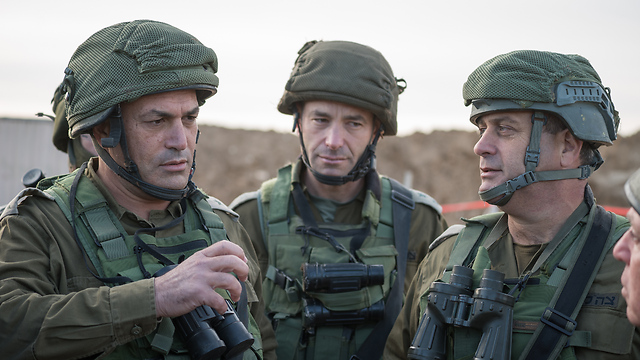
"I'm constantly excited until the discovery of the next tunnel. Sometimes, during discussions on the possible route of a tunnel—which is indicated by either technological or intelligence measures—I give them a challenge. I tell them: 'As far as I'm concerned, I see this as a cross-border tunnel. Now prove to me otherwise,'" Brig. Gen. Fuchs elaborates.
According to Fuchs, what pushed him to promote this issue were IDF Chief of Staff Gadi Eisenkot's end of the year speeches. "At the end of 2015, 2016 and 2017, when the IDF chief spoke to senior commanders about the year that had passed, he always said: 'I failed in the mission to eliminate the underground threat.' To see the commander of the military say this gave everyone an immense challenge to push this forward," he says.
Col. Avitan says the Technological Division needs more people and he can already see the demand to join the lab is increasing. "We need creative people for this field, with the ability to think outside the box, daring and nerve. People are starting to realize they have the ability, at a young age, to make a difference to state security in a vast variety of ways. In the end, what they're doing opens the news broadcast. To expand the unit and to meet the challenges we'll face in the future, we need good people," he says.
The lab's team promises that those who do join them will—in addition to the great contribution to state security—get extraordinary personal satisfaction. "You can't describe this feeling," says Cpt. Bar. "It's hard for me to think of something to compare it to."
Like scoring a goal in soccer?
"Perhaps, but only if it's the victory goal in the Champions League Final."














